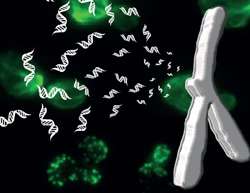Novel inhibitor implicates the TORC2 kinase in genome stability

(Medical Xpress)—FMI scientists have identified a novel inhibitor, which synergizes with low-doses of other DNA damaging agents, to induce a dramatic chromosome fragmentation even in normal cells. Unexpectedly, the compound acts an as inhibitor of a large kinase complex called TORC2, which regulates actin polymerization. With this study the scientists revealed a previously unappreciated link between the cytoplasmic regulator TORC2, actin, and repair of DNA damage.
Since the 1960s, combinations of chemotherapies have been used in cancer treatments, first mostly to reduce the risk of resistance, then, as cancer-driving mutations became better understood, to be able to interfere with several molecular processes in the cancer at the same time. Over the years, combination therapies have become increasingly sophisticated. Currently, scientists are searching for new combination therapies that provoke cell death in well-defined situations, such as in cells that carry cancer enhancing mutations.
The group of Susan Gasser, Director and Group leader at the Friedrich Miescher Institute for Biomedical Research, in collaboration with colleagues from the Novartis Institutes for BioMedical Research, have identified a very powerful inhibitor that enhances the effects of other chemotherapeutics in cancer cells. It arose from a screen for compound that enhanced cell death in cells carrying tumor suppressing mutations. Their results have been published online in the renowned journal Molecular Cell.
In a screen that combined the 1.5 million compounds of the Novartis compound library with mutations in budding yeast, they identified compounds that caused death in cells with a mutation in the checkpoint kinase ATR, or the DNA helicase, Bloom's (Sgs1 in yeast). These two proteins, which act in the context of DNA repair mechanisms, are activated to relieve DNA damage during the rapid replication of cancer cells, a chemotherapy and their mutation or loss enhances the impact of the cancer, hence the name "cancer enhancing mutations".
The screen exposed a novel compound, which is a potent inhibitor of Target Of Rapamycin Complex (TORC) 1 and 2, two large kinase complexes that control cell growth in response to nutrients. The team found that in cells treated with this inhibitor, low-doses of a DNA damaging agent, Zeocin, greatly enhanced the damage provoked—inducing a dramatic fragmentation of the yeast chromosomes within a very short period of exposure.
Based on the analysis of different yeast mutant strains, Kenji Shimada in Susan Gasser's laboratory, could show that the chromosome fragmentation arises from inhibition of TORC2, but not TORC1, which is the far better understood kinase of the pair. The relevant downstream factors are two further kinases, Ypk1 and Ypk2, which control actin polymerization. Indeed, conditional alleles of this Ypk kinase reproduces the drug-induced chromosome fragmentation and cell growth inhibition on Zeocin. Remarkably, perturbation of actin polymerization with other chemicals also caused chromatin fragmentation on Zeocin.
"In collaboration with our NIBR colleagues, we revealed a previously unappreciated link from the prototypic cytoplasmic regulator TORC2, to the repair of DNA damage," said Gasser. "For the first time we show that TORC2 can impact functions well beyond directional growth by altering actin polymerization. This is particularly interesting because all the factors identified—in particular the repair pathways—are conserved in mammalian cells."
More information: Shimada, K. et al. (2013) TORC2 signaling pathway guarantees genome stability in face of DNA strand breaks, Molecular Cell, Sep 12. www.cell.com/molecular-cell/abstract/S1097-2765%2813%2900592-3














